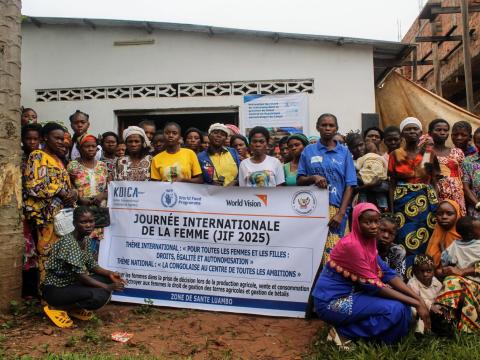DR Congo: Over 200 Women Engaged To Influence Agricultural Decisions In Luambo

By Pascaline Milemba, Communication Officer
On the occasion of International Women's Day, celebrated every March 8th, over 200 women from the health zone of Luambo in the Kasaï Central province were sensitized to the importance of their involvement in agricultural production decisions. Organized in conjunction with this symbolic day, the event highlighted the challenges of empowering women in the agricultural sector. The activity aimed to draw attention to the fundamental role women play in agriculture, which, despite being crucial, is often underestimated, especially when it comes to decision-making related to land management and the use of agricultural products.
The Key Role of Women in Land and Agricultural Resource Management
According to Hortense Edia Kombe, protection assistant at World Vision Kananga, this initiative is part of a series of activities already launched in Luiza, aimed at encouraging women to play an active role in land management, as well as in the processes of selling and consuming agricultural products.
"Women must know their rights regarding land management and economic struggles. This is how we can build a balanced society where women fully contribute to sustainable development, which will also allow us to fight against malnutrition in our communities," she emphasized.
Strengthening Women’s Decision-Making Power for Sustainable Development
For Patricianne Yakumuletela, head of the gender, family, and children department in Luiza, and facilitator of these activities, the timing of the event is crucial. She observes an alarming decline in women’s decision-making power in this part of Kasaï Central.
"This activity strengthens initiatives already in place, and we sincerely thank all our partners, especially with the support of World Vision. It is sad to note that, even though it is women who ensure agricultural production, they do not influence decisions once the harvests are brought home. Often, it is the husbands who appropriate the products, dictating their use. This activity aims to raise women's awareness and encourage them to make better decisions for the sustainable development of our communities," she explained.
These activities were organized as part of the Nutrition project, funded by the South Korean government through the World Food Programme (WFP) and implemented by World Vision in the health zones of Luiza and Luambo in the Kasaï Central province.